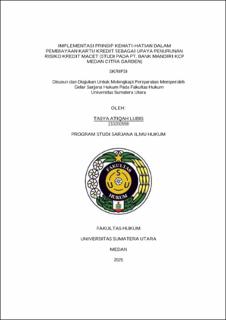Implementasi Prinsip Kehati-Hatian dalam Pembiayaan Kartu Kredit Sebagai Upaya Penurunan Risiko Kredit Macet (Studi pada PT. Bank Mandiri KCP Medan Citra Garden)
Implementation of The Prudential Principle in Credit Card Financing as an Effort To Reduce Non-Performing Loan (NPL) Risk (A Case Study at PT. Bank Mandiri KCP Medan Citra Garden)

Date
2025Author
Lubis, Tasya Atiqah
Advisor(s)
Barus, Utary Maharany
Mulhadi
Metadata
Show full item recordAbstract
Credit cards, as one of the non-cash payment instruments, have become an integral part of modern society’s lifestyle. However, the unsecured nature of credit card financing makes this product highly vulnerable to default risk, which may seriously affect the financial stability of banks. This research aims to analyze the urgency of the prudential principle in credit card financing and its influence on reducing the risk of non-performing loans, to examine the implementation of the prudential principle in credit card financing at PT. Bank Mandiri KCP Medan Citra Garden, and to identify the impacts and challenges faced in applying this principle. This study employs a normative-empirical legal method with statutory and conceptual approaches, complemented by field research. Data were collected through literature study and interviews with internal parties of PT. Bank Mandiri KCP Medan Citra Garden, and analyzed qualitatively. The research is descriptive in nature, focusing on the application of the prudential principle in credit card financing, including the selection process of prospective customers, credit monitoring, and evaluation of the bank’s internal policies. The findings show that PT. Bank Mandiri KCP Medan Citra Garden has systematically implemented the prudential principle through the 4C approach, adjusted for credit cards as unsecured loans, supported by a credit scoring system and SLIK OJK verification. This implementation successfully reduced the bank’s consolidated NPL from 3.7% in 2021 to 2.9% in 2023. The main challenges include limited accurate information on informal sector customers, document falsification risks, imbalance between human resources and customer volume, as well as customers’ low financial literacy regarding credit card mechanisms. This research recommends strengthening internal supervision, investing in IT infrastructure for monitoring, and conducting continuous educational programs to enhance customer financial literacy. With an effective application of the prudential principle, banks can maintain asset quality and strengthen the overall financial system’s stability.
Collections
- Undergraduate Theses [3142]
